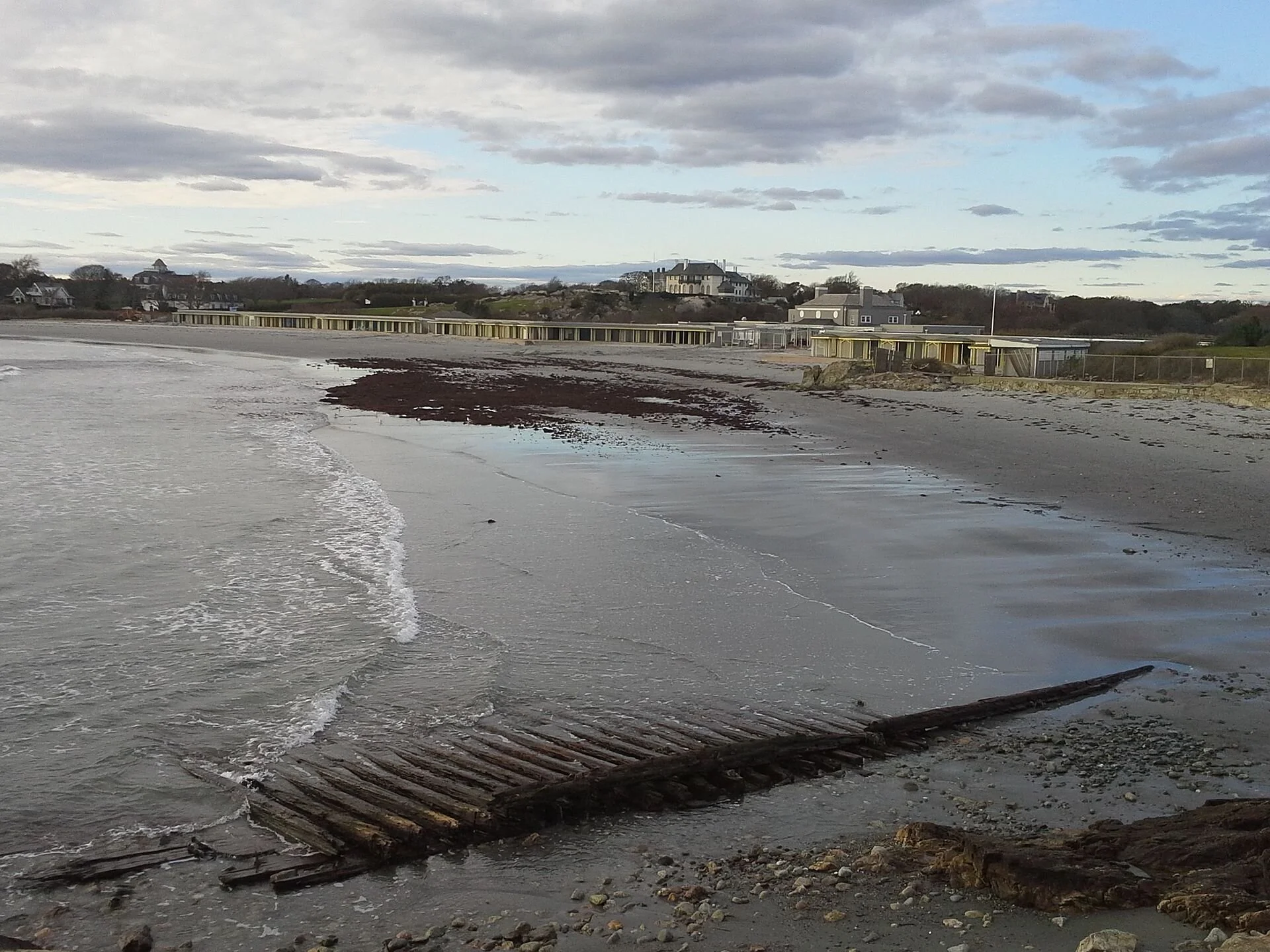Is elite club crisis silly?
Bailey’s Beach Club in 2012, with “Rejects’ Beach’’ in the foreground, soon after Superstorm Sandy. You can safely predict that a major hurricane will destroy the club’s facilities.
— Photo by Swampyank
From Robert Whitcomb’s “Digital Diary,’’ in GoLocal24.com
The latest controversy over U.S. Sen. Sheldon Whitehouse’s association with the elite, WASPy Bailey’s Beach Club, in Newport, has gone viral after being launched by GoLocal. (I prefer the silly-sounding real name of the club – the Spouting Rock Beach Association.) His wife is a member.
I don’t care much about politicians’ associations in their private life; it’s their public-policy positions that primarily interest me. But I suppose that any story about Newport’s summer creatures, blue-blooded or otherwise, has its allure. Many folks consider Newport an exotic place.
Jack Nolan, Bailey Beach’s general manager, told The Boston Globe that the club’s members and their families have included people of “many racial, religious, and ethnic backgrounds from around the world who come to Newport every summer.” Remarkable, if true…. In any event, for decades the club had reputation of being all white as well as anti-Semitic. Since it’s a private social and recreational organization it presumably doesn’t have to identify its members.
I have no idea what the club’s current diversity is or how it might change. It’s not in my solar system.
The first of a couple of times I went there was as a guest of the late Rhode Island Gov. Bruce Sundlun, who was Jewish. I also remember a couple of kids of color playing on the beach – a member’s grandchildren?
The beach itself is not very attractive – gray sand and, when I was there, ridges of seaweed with bugs flying over them. And the current clubhouse was uninteresting. It will probably be destroyed by the next big hurricane. But all was quiet and low key.
As with most membership clubs, the members clearly like being in a place where they know most everybody, including the staff, which treats them in a way recalling domestic servants. Very cozy and soothing. And for public servants such as Senator Whitehouse it must be pleasant to be in a place whose genteel tradition discourages harassing fellow members over politics or indeed anything else
Back when I was a newspaper editor I noticed that when I had a business lunch with a politician or other public figure, we were less likely to be bothered at a club than at a restaurant. And many people enjoy being taken to a meal at clubs, away from the clatter and crowds of restaurants.
No wonder such institutions are a refuge for the privileged
There are now far fewer clubs around that are overtly discriminatory than a few decades ago. Back then the bias at the old WASP clubs, many of which were founded in the late 19th Century with money made in the Industrial Revolution, led to creation of golf, yacht and other clubs that catered to America’s newer groups. So there were “Jewish country clubs,” “Italian country clubs,” “Irish country clubs,’’ and so on. Of course, racism generally kept Black people out of fancy clubs.
I can remember when Roman Catholics were excluded from many old golf clubs and yacht clubs in New England towns, in one of which I grew up in. The election of John F. Kennedy to the presidency helped open them up. In the end, the old clubs needed the initiation fees and dues money from “new” groups that were rising socio-economically.
Around here, I’ve only been a member of one club – the Providence Art Club, whose 16 co-founders (in 1880) included 10 men, including the distinguished African-American painter Edward Bannister, and six women. I’m no longer a member, though my wife, a painter, is. The club has a public educational and cultural mission, by the way.
Folks will always tend to coalesce into groups with whom they share certain background elements, attitudes and social behaviors. So clubs like Bailey’s Beach won’t go away, though they’ll change their memberships as America’s demographics change. They’ll need the dues money.
Meanwhile, given that the U.S. Senate is mostly a white male millionaires’ club, I’m sure that others besides Sheldon Whitehouse have some connections with exclusive (ethnically or otherwise) institutions. The GoLocal stories might lead media around the country to check into them. The voters can decide how important or trivial these associations are in the broad scheme of things.
